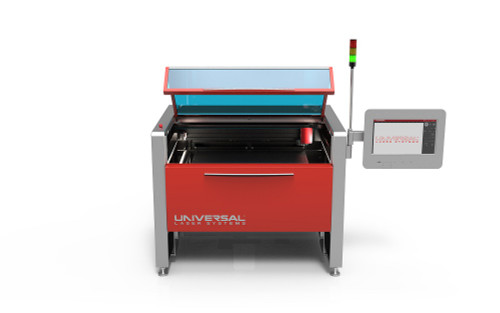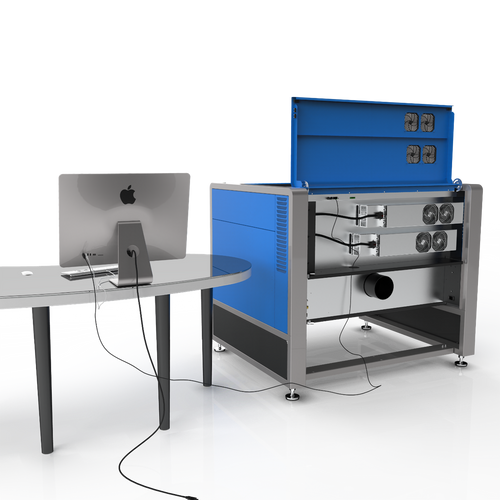Product Description
Key Features and Capabilities
- Material processing area of 36 x 24 in. (914 mm x 610 mm)
- Support for materials with a thickness up to 12 in. (305 mm)
- Maximum power configuration is 300 watts CO2 and 50 watts fiber
- Supports three lasers - up to (2) CO2 laser sources (10-150 watts) and up to (1) permanently mounted fiber laser source
- Patented Multi-Wave HybridTM Technology
- Patent pending Controllable Laser Power Density optics
- Material Independent Touch-Probe Autofocus
- Intelligent Materials Database
- Camera Registration
- 21” (533 mm) Touch Screen Control Panel
- Patented SuperSpeedTM technology available
- Fire Suppression available
- UAC 4000 Air Filtration available
Features, Configuration Components and Specifications
| Design File Geometry Preservation | A feature that maintains curves in a design file, i.e., circles, ellipses, b-splines, Beziers, and NURBS, and ensures curves are kept throughout the path planning process rather than using linear interpolation. |
| True Position Laser Pulsing | A feature that provides optimal laser pulse placement driven by positional feedback from synchronized multi-axis encoders. |
| Camera Registration | A feature that aligns a control file to registration marks or features on the surface of a material. Compensates for scale, skew, and perspective. |
| Precision Material Independent Autofocus | Repeatability of ± .0025 in. (63.5 μm) using motorized focus assembly and high-resolution touch sensor. |
| Rapid ReconfigurationTM | A patented technology that enables users to install and reinstall any supported ULS CO2 laser source onto any ULS laser system without tools and optical alignment to optimize laser processing for the widest variety of materials. |
| Intelligent Materials Database | A powerful and unique database that generates laser processing parameters for a wide variety of materials and laser system configurations. If the system configuration changes, the database automatically recalculates the parameter values. |
| Multi-Wave HybridTM Technology (available) | A patented technology that enables a combination of laser wavelengths (up to three wavelengths) to be focused to the same focal point within the same focal plane and used either sequentially or simultaneously. |
| Controllable Laser Power Density 4X, 1X / 13X (4X included, 1X/13X combination available) |
A patent pending feature that provides the unique ability to control laser power densities while maintaining a high degree of alignment accuracy of the focal plane with the material surface as well as a Gaussian beam distribution. Power Densities: 1X (Available), 4X (Included) or 13X (Available) for 10.6 μm and 9.3 μm wavelengths; 52X for 1.06 μm Fiber wavelength (Included). Normalized power density (watts/cm2) = power density coefficient x 103 x average laser power (watts). Normalized power density is the power of the material processing laser(s) divided by the area of the focal spot measured at 1/e2. |
| Dynamic Energy Stabilization | A feature that maintains even laser energy delivery regardless of the speed of the motion system. |
| Line Segment Reduction | A user control to reduce excessive line segmentation contained in some design files. |
| Intelligent Path Planner | A user adjustable control to define acceleration of vector motion for each control file. |
| Vector Acceleration Control | A user adjustable control to define acceleration of vector motion for each control file. |
| Path Deviation Control | A user control to adjust the allowable deviation from the intended path to increase throughput. |
| True Width Raster Processing | A feature that eliminates the need for motion system over-travel beyond the edges of the raster image. |
| SuperSpeedTM Technology (available) | A patented feature that produces two focal spots (one for each laser beam) to enable the system to deliver two independently controlled raster lines at a time. SuperSpeedTM requires a laser system equipped with two CO2 lasers of the same wavelength and power. |
| Automation Interface | An addressable device that can receive input signals and provide output signals. Enables the laser system to control external devices and allows external devices to initiate laser system functions. |
| 21” Touch Screen Control Panel | A fully integrated 21” (533 mm) touch panel command and control console used to control laser system operation. Eliminates the need for a separate control computer. |
| Laser System Manager (LSM) | An advanced user interface with a high degree of functionality and control that allows users to efficiently manage design files and laser material processing parameters. |
| Industry Standard Interchange Format Support | A software feature that supports industry standard graphic interchange formats including DXF, PDF, and G-Code. |
| Design File Relocation and Duplication Controls | A set of user controls to reposition or duplicate design files anywhere within the material processing field. |
| Kerf Compensation | A user adjustable control that compensates for material width removed during laser cutting in order to achieve desired dimensions without changing the design file. It maintains true arc and circle geometry if present in the design. |
| User Access Administration | A software administration feature for managing multiple user accounts and permissions. |
|
GAS ASSIST |
|
| Programmable Gas Assist (requires gas and/or air sources) | A feature that allows the user to program gas type and flow rate on a process-by-process basis within a control file. |
| Optics Protection (requires air source) | A barrier of clean air that protects optical components during processing. |
| Coaxial Gas Assist Attachment | A gas assist attachment that directs air (or gas) perpendicular to the material’s surface. |
| Lateral Gas Assist Attachment (available) | An adjustable gas assist attachment that directs air (or gas) laterally or at an angle to the material’s surface. |
| Air Compressor (available) | A compressed air source that delivers optimally conditioned, clean, dry, and oil-free air for optics protection and gas-assisted laser processing. |
|
MATERIAL HANDLING |
|
| Multifunction Material Support Structure | A built-in aluminum honeycomb work surface designed to keep materials stationary and in focus during laser processing. Reduces back reflection and enables exhaust of laser processing byproducts from underneath materials. Includes a full-field masking material dispenser. Configurable using Machined Aluminum Tiles, Material Support Pins and Vacuum Booster. |
| Machined Aluminum Tiles (available) | An accessory that provides a rigid and smooth work surface for laser material processing. When used with cutting processes, the compatible Material Support Pins are recommended. |
| Material Support Pins (available) | A set of custom machined pins for laser cutting that can be inserted into either the Multifunction Material Support Structure or the Machined Aluminum Tiles. Pins add sufficient space between the target material and the work surface to eliminate back reflection. |
| Vacuum Booster (available) | An external accessory that dramatically increases the pressure differential between the material support surface of the Multifunction Material Support Structure and ambient/atmospheric pressure to keep materials stationary. |
| Class 4 Conversion Module for Pass-Through (available) | A patented technology that enables the laser system to facilitate material pass-through in compliance with CDRH and international safety regulations for operating Class 4 laser systems. This optional, add-on module converts a fully enclosed Class 1 system into an open Class 4 system. |
| Rotary Axis Module (available) | An accessory that enables 360° rotation laser processing of cylinders, spherically-shaped, and tapered objects. The addressable resolution is 13 arc seconds. |
|
AIR FILTRATION and HANDLING |
|
| Intelligent Air Filtration UAC 4000 (available) | An external accessory that uses a patented dual carbon filter and sensor suite (for CO and VOCs) that filters out laser processing byproducts, monitors filtration performance at every stage, and alerts the operator when predefined contaminant thresholds have been reached. Connects directly to the laser system to turn filtration on and off with laser processing and communicates the status of all aspects of the UAC 4000. |
|
SAFETY and FACILITY |
|
| Overtemperature Detection | A safety feature designed to disable all laser sources, home the motion system, and trigger an audible alarm in the event it detects an unusually high temperature in the laser processing area. |
| Safety Interlocks | A safety feature that disables the laser source when access doors are open as required by all major international safety standards. |
| Laser Blocking Laminated Safety Glass | A shatterproof multi-layer laminated safety glass with appropriate wavelength filter media. Meets laser safety requirements OD 5+ for 10.6 μm , 9.3 μm and 1.06 μm wavelength laser radiation. |
| Metal Enclosure with Labyrinth Seals | A design feature consisting of overlapping flanges that all enclosure doors or access panels must have to prevent direct line of sight into the enclosure, as required by international safety regulations. |
| E-Stop | A highly visible standards-compliant pushbutton. Once depressed, DC power to all laser sources, the motion system, and other control mechanisms are immediately shut off, while aborting all system operations. |
| Fire Suppression (available) | A patented accessory that deploys fire suppressant into the laser material processing area if self-sustained combustion is detected. |
| Collision Detection | A feature that immediately stops and disables servo motors In the event an obstruction interferes with the motion system from any direction or axis. |
| Light Tower | A set of color-coded lights mounted atop a pole used to indicate the laser system status to personnel in visual proximity of the laser system. |
|
SPECIFICATIONS |
|
| Material Processing Envelope (X,Y,Z) | 36 x 24 x 12 in. (914 x 610 x 305 mm) |
| Minimum Addressable Beam Positioning | 2 micron (.00008 in.) beam position addressability |
| Mechanical Positioning Repeatability | ± 10 micron (.00039 in.) repeatability |
| Maximum Positioning Speed | 175 in./sec (4445 mm/sec) |
| Maximum Effective Raster Processing Speed | Equivalent to more than 300 in./sec (equivalent to more than 7620 mm/sec) - Requires SuperSpeed configuration |
| Maximum Functional Vector Processing Speed | Equivalent to more than 300 in./sec (equivalent to more than 7620 mm/sec) − Requires SuperSpeed configuration. |
| Multiple Laser Support | Up to (2) CO2 laser sources and (1) permanently mounted fiber laser source Supports Rapid Reconfiguration™ of CO2 lasers |
| Laser Sources Available | 10.6 μm CO2: 10, 30, 40, 50, 60, 75 and 150 watt laser sources 9.3 μm CO2: 10, 30, 50 and 75 watt laser sources 1.06 μm Fiber: 50 watt laser source |
| Laser Sources Combinations | Up to (2) CO2 laser sources and (1) permanently mounted fiber laser source Supports Rapid ReconfigurationTM of CO2 lasers |
| Maximum Laser Power | 300 watts CO2, 50 watts Fiber |
| System External Dimensions | Width: 63.09 in. (1603 mm) with Control Panel folded 87.75 in. (2229 mm) with Control Panel extended Depth: 50.07 in. (1272 mm) Height: 47.67 in. (1219 mm) to top of enclosure 74.42 in. (1890mm) to top of Light Tower |
| Weight | 550 lbs (250 Kg) |
| Power Requirements | 220V-240V/20A (300 Watt configuration requires high power kit and 30A) |
| Exhaust Requirements | Intelligent Air Filtration (UAC 4000) or External Exhaust Blower Capable of >700 CFM at 6 in. WG Static Pressure (1190 m3/hr. at 1.5 kPa) 6 in. (152mm) Exhaust Port |
| Computer Requirements | Not required; includes integrated 21” Touch Screen Control Panel |
| Laser Safety Classification | Class 1 for material processing lasers Class 2 overall due to red laser pointer Can convert to Class 4 with optional Class 4 module |












